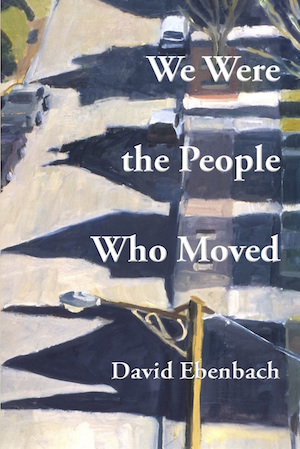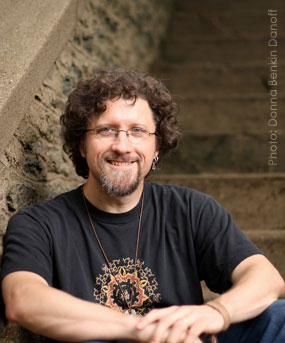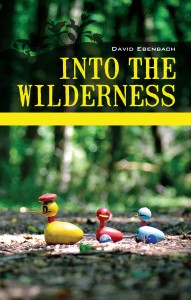We Were The People Who Moved, by David Ebenbach. Tebot Bach, 2015. $16, 95 pages.
We Were The People Who Moved (Tebot Bach 2015) is David Ebenbach’s fifth book and first full-length poetry collection. Concerned with both place and impermanence, his poems ask what constitutes home and how cities imprint onto residents. For example, the final poem in the book, “Autogeography,” begins, “Finally, the body is littered with landscapes” and goes on to promise that “the wanderer will settle into one place.” Ebenbach’s interest in contemporary nomadic American life is echoed in his observations about Judaism, a religion marked by biblical and historical displacement. Spirituality grounds the collection. In his poem “Ha Lachma Anya,” which includes an imagined conversation with the poet Jane Kenyon, Ebenbach juxtaposes the practice of writing with the formal traditions of Jewish life:
One of the greatest problems
concerning the Passover holiday is keeping kosher,
says a Jewish website. But I was talking about poetry.
Poetry, like Judaism, is an act of faith, a practice which requires questioning, breaking, and at times, even, following rules.
Ebenbach’s writing contains multitudes. In a single poem, he can switch from funny to earnest, intimate to anthropologically distant. Take for instance the poem “Birds, Et Cetera” which begins:
I’m going to write a memoir,
just as soon as I get it together
and start appreciating life.
The tone is frank, but because this poem is a third of the way into a book replete with sincere admiration, it’s clear to the reader that “appreciating life” isn’t in fact what’s holding this speaker back. The problem, Ebenbach declares, is that he doesn’t notice “birds, et cetera. Flowers / and what not.” What he does notice are his wife’s allergies and the bird shit on the door of his car. These wry observations are quickly undercut by a more serious problem:
how so many people
have worked so hard to get a car
but don’t have anywhere to go.
The failure to find a destination is almost clinically observed, but Ebenbach doesn’t stay in this register long. The aimless car owners have:
a handful
of excrement, and nobody’s hand
to shake anyway.
We Were The People Who Moved is smart, lyrical, and full of insight. Spiritual observations disguise themselves in plainspoken humor, and intellectualism gives way to intimacy. This is a collection for re-reading, a book to be dog-eared, underlined, and loved. I was fortunate enough to catch up with David Ebenbach for an interview.
INTERVIEWER
Your collection’s titular and opening poem, “We Were the People Who Moved,” includes the lines, “we moved back at least as often as we moved forward. Even when we weren’t moving at all we were in some sense moving back.” There’s an interesting passivity in this poem. In a country and time so focused on progress, such disinterest is surprising and creates narrative tension.
EBENBACH
This is such a great observation—thank you. I think you’re exactly right that this poem stands in counterpoint to the traditional American idea of “progress.” I really have moved a lot in my adult life—seven times in the last thirteen years—and the moves were mainly for job opportunities, which sounds like a narrative of progress, but it’s always been more complicated than that. You might move somewhere to take on a great job, but then you’re further away from family. Or you might move for your spouse’s job, which is a step forward for the person you love and the family generally but can be hard personally. So there’s tension between forward and back, and, just as forward isn’t always good, back isn’t always bad. I wrote this particular poem to talk about an experience where my family and I had moved somewhere for good reasons, but most of the time we just wanted to be back where we used to be. We wanted to be back home, whatever that exactly means.
The moves were mainly for job opportunities, which sounds like a narrative of progress, but it’s always been more complicated than that.
INTERVIEWER
A few years ago, at a panel discussion on religion and writing, I heard someone say that honest writing about faith is one of the most taboo subjects in contemporary literature, that we’ve come to expect sex and violence and drugs, but earnest prayer, for instance, is shocking. Judaism is a theme in many of the poems in this collection. What role does religion play in your writing and in your life?
EBENBACH
It’s hard for me to separate my writing from my religious/spiritual life. First of all, they’re both an integral part of who I am. And they both seem intensely concerned with the same high-stakes, life-driving questions—meaning, purpose, the human experience. As they ask those questions, I think they point in the same direction: toward something that’s beyond me; toward complexity; toward empathy and wholeness; toward an experience of awe. For me, Judaism and writing are two interrelated expressions of a singular inner need: specifically, the need to see past the apparent ordinariness and triviality of things all around us to their extraordinary significance. Holidays, davvening, metaphor, the surprising observation or turn of words: they all show me that life matters, and that I ought to live mine well.
INTERVIEWER
Many of your poems contain observations about your surroundings. For example, in “Shabbat Comes Over West Philadelphia,” you provide a panorama of the city:
Street lights hum on.
Cars click slowly into spots on this block
Or the next while someone stretches out
on a bench in Clark Park, the ongoing
sound of basketball not a rhythm but
a cadence.
Your attention to details of place brings to mind poets like Charles Baudelaire, Donald Justice, and Frank O’Hara. Who are the poets that influence and inspire you?
EBENBACH
First of all, thank you—I’ll happily associate myself with those folks. But which poets have influenced and inspired me most? Jane Kenyon comes to mind first—she even shows up in one of my poems in this book—because of her grasp and articulation of the inner life of feeling. When I started reading her stuff, it was an experience of not only admiration but also recognition—she saw a world that I see, too, and she knew how to talk about it. I also love Stephen Dunn, because he somehow manages to be simultaneously plain-spoken and magical. Rilke because he talks about the soul better than anyone else. Yehuda Amichai, who is also plain-spoken and magical and makes impossibly hard things look easy. Sylvia Plath, Mark Doty, Rita Dove, Philip Levine. The list goes on! And then there’s Jaimee Kuperman—a fantastic, smart, hilarious poet and also my main source of poetic feedback; we’ve been sharing our work for a few years now. You could certainly argue that she’s had a bigger impact on my work than anybody else.
INTERVIEWER
You write quite a bit about Richmond, Indiana and Philadelphia. What is it about these places that interests you?
Luckily, longing is great fuel for poetry.
EBENBACH
Well, I was born and raised in Philadelphia, and, like a lot of people raised in Philly, I have a kind of irrational and probably not totally healthy attachment to my hometown. I mean, it’s a great city—full of life and art and strong emotion and opinions and complicated social dynamics and good food and a down-to-earth, in-your-face approach to everything and everyone—but my attachment goes beyond reasonable appreciation. It divides the world into two kinds of places: (1) Philadelphia and (2) places-that-are-not-home. I like living in Washington, DC, for example, and I bet I could live here for a very long time, but it can’t really be home. Luckily, longing is great fuel for poetry.
Richmond is a different story. My wife and son and I lived in that area for five years so that I could teach at a wonderful school called Earlham College—everyone should get to go there for college—but unfortunately the location, for a variety of reasons, was not a fit. Being there was an experience of feeling continuously out-of-place. Luckily, alienation is also very good fuel.
INTERVIEWER
In your poem “Limits,” you compare desire to a graph:
Given two ordinary lines in open space, it’s possible for one of those lines to curve toward the other without ever reaching it… The problem is that the lines are not lines but bodies, two, walking half-drunk at night together, closer than they need to be.
To me, math feels incredibly unromantic, and yet I was very moved by this conceit. Where did this metaphor come from? More generally, how do you know when to use figurative rather than literal imagery in your writing and what distinguishes a strong metaphor from a weak one?
EBENBACH
Wow—that’s an excellent question that I may not know how to answer, though I’ll try. I mean, on some level I guess I just write what I think. A metaphor comes out when I look at a situation and something about it makes me see it metaphorically, and some literal description comes out when I have a more literal view of a situation. And then in revision you have to make it work, and make sure the metaphor is coherent and that it connects usefully to other things in the poem, so there’s some conscious work there—but the first stage is a more-or-less direct transcription of how I’m seeing things. In this particular poem, there’s a feeling that the two people—the guy, in particular—can’t express, and I instinctively saw it mathematically probably because I wanted to try to help him get it under control. But of course the feeling shows up in the math all the same, because the most powerful feelings in the world are the ones you aren’t allowed to express.
INTERVIEWER
In addition to poetry, you also write short stories. How does fiction inform your poetry? When you first start writing, how do you know you’re writing a poem and not a story?
EBENBACH
I’m really glad that I write both. It seems really clear to me that, if I only wrote in one form, I’d only be able to talk about some of the things I want to talk about. More than once I’ve had the experience of starting out with a piece, writing it as a short story, and discovering that it would work better as a poem (or vice versa). If I only wrote in one form, I’d lose that piece. One example from this book is “The first flowers of one of the final springs,” which I originally thought would be a short story. But pretty fast I felt like prose concerns—paragraphing and a certain kind of clarity of dialogue and narrative development—were getting in the way of what I was trying to write. So I told myself to think of it as a poem—a prose poem, but still a poem—and that freed me up to zoom in a little more. I don’t believe there’s a sharp line between prose and poetry—and both poems and short stories share an interest in the small things—but leaning in one direction makes me focus more on character and plot, and leaning in the other makes me focus more on imagery and language and the moment.
I don’t believe there’s a sharp line between prose and poetry—and both poems and short stories share an interest in the small things—but leaning in one direction makes me focus more on character and plot, and leaning in the other makes me focus more on imagery and language and the moment.
INTERVIEWER
“The Poem is Interrupted” surprised and delighted me. It begins:
My son enters the poem
forcefully. He is four years
old and has no time for
the landscape I’ve been
building.
How has parenting impacted your writing life? And to what extent does your own family life enter into your poetry? In addition to your son, marriage comes up again and again throughout the collection.
EBENBACH
In writing this book that’s mainly about place, about the search for home, I discovered that my family is, in fact, my home. Maybe it’s true for everyone. After all, there’s the old question: “Where would I be without you?” It’s meaningful that the question asks “Where” and not “How.” Being without the people you love—or even just being in serious conflict with them—it isn’t just upsetting; it leaves you displaced. And being with them means being placed.
As for parenting specifically, oh, boy—how much time do you have? Before I became a parent, I thought parenting would change my life enormously. As it turns out, that was a profound underestimate of how much it actually ended up changing my life. Wow, is parenting huge! And so it changed my writing life, too, and my writing, and certainly informed the work. I wrote a whole book of short stories—Into the Wilderness—entirely about parenthood, because (especially during the first couple of years) it was practically the only thing I was able to think about. And one of the beautiful things about that was the way it interrupted my habitual preoccupations. I’d be solemnly considering questions of place and home and my kid would come into the room with a bunch of erasers that he was collecting for some very kid-like reasons, and that would blow things up. Things that needed to get blown up.
David Ebenbach is the author of five books of poetry, fiction, and non-fiction, including the poetry collection We Were the People Who Moved (Tebot Bach) and the short story collection Into the Wilderness (Washington Writers’ Publishing House). Winner of the Drue Heinz Literature Prize, the Patricia Bibby Prize, and the Washington Writers’ Publishing House Fiction Prize, Ebenbach has a PhD in Psychology from the University of Wisconsin-Madison and an MFA in Writing from the Vermont College of Fine Arts.
Anya Groner’s poetry, prose, and fiction can be read in journals including The Atlantic, The Oxford American, Guernica, Ninth Letter and Meridian. A fiction editor for Terrain.Org and a book review editor for New Orleans Review, she also teaches writing at Loyola University in New Orleans.



